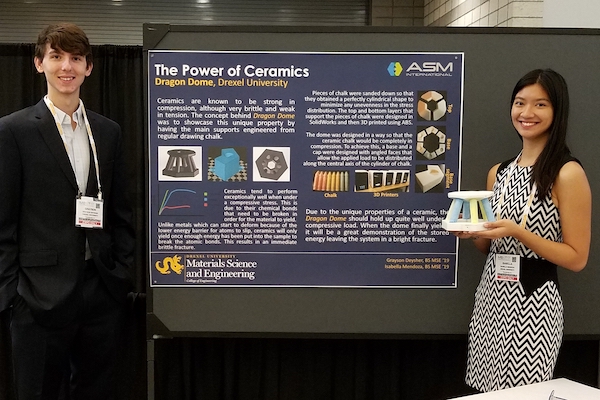
The Department of Materials Science and Engineering offers either a a five-year (three six-month co-ops) or a four-year (one six-month co-op) bachelor of science (BS) degree, with the five-year degree being the recommended option.
BS Program Key Components
Engineering Core Curriculum
The Engineering Core Curriculum is an innovative, introductory curriculum, which covers the first two years of the program and is common for all engineering students, the primary difference being that materials majors need to take MATE 221 in the winter term of their sophomore year. Courses taken in the first two years provide students with the fundamental math, science, and engineering skills and knowledge required for the core materials curriculum. In the spring term of the sophomore year, students have the fundamental knowledge in engineering to start their first six-month co-op position.
Core Drexel Materials Curriculum
Beginning in the pre-junior, or third, year, students focus on the core Drexel Materials curriculum, which includes the choice of a track in one of the following areas: energy, medical technologies, sustainability, manufacturing and materials processing, or a "custom" track, which enables students to focus their technical elective courses in an area of specialized interest.
Curriculum Templates
Drexel Cooperative Education (co-op) Program
The Drexel cooperative education (co-op) program, overseen by the Steinbright Career Development Center (SCDC) enables students to balance classroom theory with practical experience prior to graduation. Every BS undergraduate student spends one to three six-month co-op periods working in industry or in a research laboratory. Through their co-op experiences, students gain valuable real-world skills that lead to improved learning and enhanced professional development. Combined BS/MS students have the option of waiving their third co-op to finish the MS portion of their degree.
Capstone Senior Design Project
The capstone senior design project is intended to simulate a professional research and learning environment, providing students with experience in solving problems independently and/or working in a group on an open-ended research/design problem, and to refine students’ skills in materials synthesis, processing and characterization, information gathering, analysis, critical thinking, and communication.